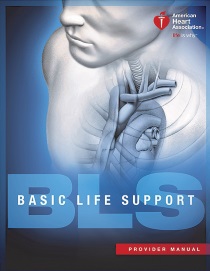Onsite Basic Life Support (BLS) Certification Courses
One of EMC’s many onsite training options is Basic Life Support BLS. We can perform this vital training in the familiar surroundings of your office or clinic, making it easier for more of your staff members to earn this certification.
 BLS and CPR: What’s the Difference?
BLS and CPR: What’s the Difference?
You’ll often find people using the terms “BLS” and “CPR” interchangeably, but they are two different things. CPR, which stands for cardiopulmonary resuscitation, is performed on victims of cardiac arrest or drowning and involves chest compressions and artificial ventilation. CPR-certified can perform CPR, but anyone can become CPR-certified with proper training. It’s important because you never know when you might be in the right place at the right time to save a life.
BLS, on the other hand, stands for Basic Life Support, an emergency medical treatment used when a victim’s heart has stopped beating. The BLS certification is one that healthcare professionals get. It is beneficial for those who work in medical clinics and other pre-hospital settings.
What Our Onsite Basic Life Support Certification Course Covers
CPR training is an integral part of a BLS course but is not the only component. Our BLS training is designed according to American Heart Association (AHA) guidelines and includes:
- Training in how to perform CPR on adults, infants, and children, including how to use quality chest compressions
- How to use an AED and the importance of early AED use
- When and how to relieve choking in adults, children, and infants, including removing foreign bodies from the airway
- How to perform ventilations using a bag valve mask
- When and how to work in teams for multi-rescuer CPR
Who Needs Our BLS Certification Courses?
Since the BLS certification is primarily associated with the healthcare field, providing an extra level of training and a special certification, we recommend it for all types of medical care providers, such as doctors, nurses, and other personnel who work in medical facilities. However, this vital training is also ideal for non-medical first responders such as firefighters and police officers, who are often required to train for and obtain BLS certification. Because this certification is more advanced than layperson CPR, we also recommend this training for other professionals such as doctors, nurses, medical assistants, dentists, paramedics, EMTs, firefighters, police officers, etc.
Onsite Basic Life Support Certification and Career Advancement
BLS training is more than just a good idea — it can even help you go further in your medical career. Doctors and nurses are required to obtain BLS certification, but there are many other jobs in which BLS certification is either required or preferable:
- Medical Assistant: These professionals can be found in many doctors’ offices and hospitals, performing functions such as taking vital signs, taking medical histories, giving injections, and more. Though they don’t often deal with life-threatening situations, it’s good to have a BLS-certified medical assistant on hand in case of emergencies.
- Dentist: BLS certification is required for dentists, and depending on the Dental Board in your state, getting recertified may count toward your Continuing Education requirements.
- EMT and Paramedic: BLS certification is, of course, required for EMTs, and paramedics often begin with BLS certification before getting more advanced training.
- Police and Firefighters: As “professional rescuers,” firefighters are required to have BLS certification. And while police officers don’t usually need medical techniques, they are often the first on the scene of an accident or an attack. Depending on the state, police officers are often required to obtain CPR, First Aid, First Aid certification, and BLS certification.
Every workplace is different, even within the same field or profession. If you know that BLS certification is required for some or all of your staff, or if you want to be as prepared as possible for emergencies, let us bring this lifesaving training to you! Imagine, a scenario where a trained EpiPen person may be needed? Contact us to learn more about our onsite BLS courses and AED management.
We offer training all over the USA. For example Queens, Syracuse, Seattle, Cleveland, Nashville,
